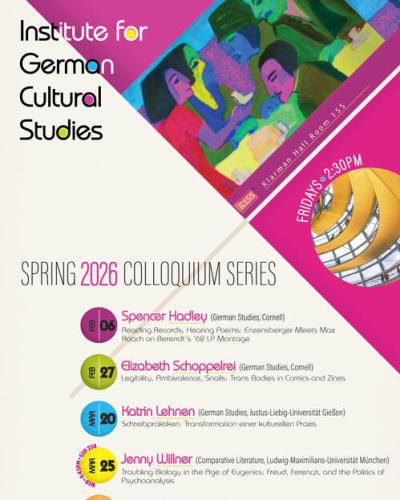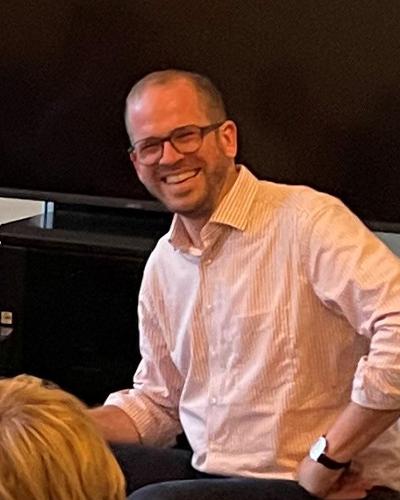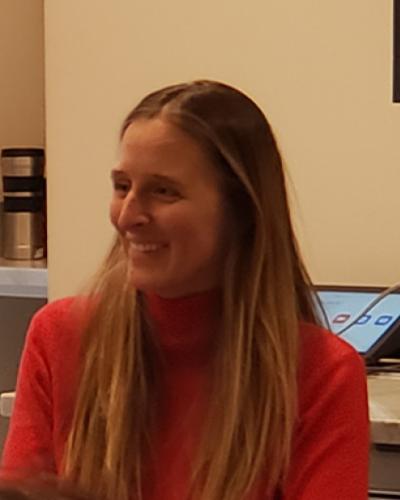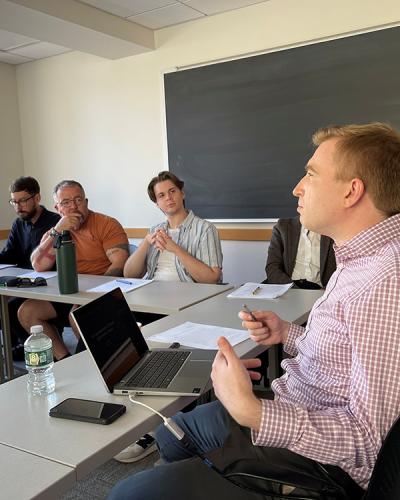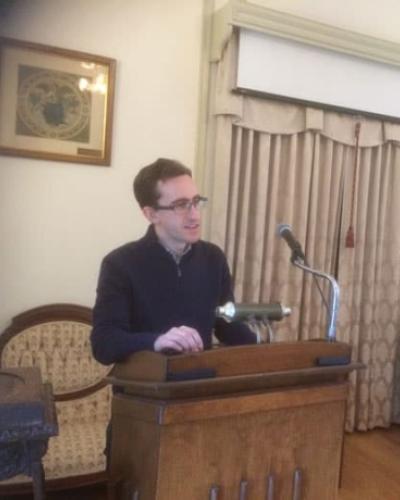Expertise and Authority Conference: Day One
September 21, 2018
On September 21, 2018, Professor Peter Gilgen (Cornell University) opened this year’s collaborative network conference: “Literature, Knowledge, Media,” organized around the theme of expertise and authority, with a talk entitled "Information and the Authority of Poetry.” The presentation focused on overcoming the urge for newness in the information age and how poetry, which activates language on both semantic and semiotic levels, can be a model for granting information a timeless significance. Gilgen explored this premise through an analysis of Oswald Egger's book Die ganze Zeit, a text that attempts to interconnect poetry and images without having them fuse together into a whole.
Gilgen’s talk was followed by Professor Ada Bieber (Humboldt University), who presented on “The Authority of Wax.” Bieber shifted the conversation to the motif of the child flaneur in Heiner Carrow's film Ikarus (1975), which escaped GDR-censorship since it was labeled a children's movie by the authorities. Carrow’s film raises two disturbing questions: are parents ultimately responsible for their children’s destruction? Does the process of child-rearing depicted here lead to the boy's figurative suicide?
Andreas Lipowsky (Humboldt University) gave the next talk entitled "Vitalism and the Revolution in (British Social) Anthropology.” Lipowsky’s presentation outlined an “immersive approach” to anthropology by drawing on two seminal anthropologists, Bronisław Malinkowski and Franz Boas, whose work interrogates the broader context of modern anthropology’s general suspicion against science. Together with this general trend, Malinkowski and Boas considered science to be “bloodless” and therefore a threat to humanity.
Sebastian Brass (Harvard University) gave the last presentation of the morning session with his talk entitled “Candor and Expertise: Autobiographical Authority and its Crises.” Brass explored the paradoxical question of how biographical texts may be said to be self-referential on the one hand, yet still lacking in self-awareness, on the other. Brass approached this topic by investigating the different ways that make a biography “trustworthy” to its reader (i.e. how it creates a sense of authority). Brass concluded that the most important devices were formulations meant to produce the effect of factuality and sincerity. (Sophia Léonard)
Anatol Heller (Humboldt University) opened the second panel of the conference with a talk titled: “Anfänger: Husserl und Kafka.” In the talk, Heller explored how the question of “beginnings” might be regarded as a primal question; one that has always preoccupied human reflection. According to Heller, such a search for the origins also concerns a practice of beginning, which is just as necessary as it is problematic. To illustrate this point, Heller discussed how every beginning is always preceded by criteria that themselves function as a kind of beginning, which complicates the idea of originality as such. As he argued, the idea of a radical beginning as an epistemic operation subverts and constantly questions itself by creating a complex operative dynamic. Not only does it make its way through theoretical and methodological decision-making and justification procedures, but it also becomes part of a language of reflection and writing practice, in which the traces of the beginning can always be understood in terms of representational form. Resulting from this is the figure of a "beginner," who self-identifies as an expert, which Heller then went on to discuss through the works of Husserl and Kafka. Heller noted that in the "bottomless beginning" of Husserl’s transcendental phenomenology, the figure of a beginner––who is not a dilettante––emerges and this figure’s "sense for the seriousness of the beginning" becomes philosophically qualified. Heller then discussed Kafka's fragmentary writings and how the practice of beginning becomes tangible as a textual problem in works like “Der kleine Ruinenbewohner.” In that work, Heller claimed, the “little ruin dweller” constantly searches for the origin of his "ruined" life, starting over and over again from an indeterminate beginning. Heller concluded that both Husserl’s and Kafka’s attempts to find the “right” beginning comes at the cost of never reaching an end.
Uta Sommer (Humboldt University) was next to present with her talk titled: “Ich mache Ihnen den Vorwurf der Unwissenheit!” In the talk, Sommer pointed out how many of Arno Schmidt’s protagonists are solitary, impoverished, autodidacts, whose passion for mathematics, astronomy, and statistics contribute to their status as “know-it-alls.” According to Sommer, Schmidt’s know-it-all protagonists display their vast and eccentric knowledge by describing antiquarian books, files, and maps; by making apodictic judgments; and by expressing their literary preferences on every possible occasion. Throughout the talk, Sommer developed close-readings of Schmidt’s know-it-all protagonists, paying special attention to the status that education and knowledge holds for these curious figures. Sommer argued that models of recognition play a key role in legitimizing these figures, especially as it relates to recognizing their ability to surpass any and all competition. For Sommer, however, this also means that the figure of the know-it-all is mutually produced: it can be formed by the know-it-all themselves, yet it can also be attributed to them, for example, from an anti-intellectual standpoint. On the one hand, being a know-it-all can have its own value. On the other, it can also become a source of resentment insofar as such individuals have a tendency to become dogmatic and pontificate their knowledge. Central to Sommer’s thesis was that Schmidt's protagonists oscillate between a useful form of knowledge and a useless form of knowledge that lies somewhere beyond the recognition model and the desire to be recognized. (Matthew Stoltz)
Following Uta Sommer’s talk, the panel turned last but not least to Endre Holéczy (NYU). Holéczy spoke on “Defiguring Authorial Subjectivity: Metalepsis in Jean Paul Richter’s Leben Fibels.” Departing from the formal quirk in this early nineteenth-century novel that not just one, but a series of characters emerge as candidates for the central narrator and thus authorial authority in the work, Holéczy used the narratological concept of metalepsis, as developed by French literary theorist Gérard Genette, to better understand the crisis of narrative and authorial subjectivity in the text. However, Holéczy argued that the confusion of voices proliferates to the point that it becomes not only difficult to identify some central narrator or movement between narrators, but that a “defiguration effect” is brought to bear on the omniscient narrator as such. According to Holéczy, this technique replaces author with text, producing a “troubling effect” whereby “the narrating world is actually a narrated one, and along these lines, the narrating entity and its narratees belong to the same narrative,” a flat world void of any reliable frame or stability. This situation, Holéczy elaborated, has dire implications not only for the authority of the author and narrator, which “implode completely,” but also for narratology and its analytical concepts, like metalepsis. If metalepsis as a figure of reading is possible when narrative frames experience momentary breaches, when levels of narrative knowledge briefly implode, then the universe of Jean Paul’s Das Leben Fibels pushes metalepsis to its limits. Holéczy concluded by considering how switching from Genette’s voice-based notion of metalepsis to one based on writing might engender the most stable reading of this text. He proposed that Das Leben Fibels may “exhibit another textuality”, one “based not on an intertwining of voices, but rather on a network of writings.” (Juan-Jacques Aupiais)
Joseph Vogl (Humboldt University) gave the conference’s keynote address, titled “The Strange Survival of Theodicy in Economics.” Exploring the interstices between the theological question of theodicy and finance capitalism, Vogl showed how the concept of theodicy and its history provide a unique perspective from which to consider the development of modern capitalism, which is informed by an ideology assuming that a benevolent, “invisible hand” guides the market toward prosperity. According to Vogl, the belief that “the market knows best” reproduces a secular variation on the theme of theodicy that he terms “oikodicy.” Touching upon the two central themes of the conference––authority and expertise–– the idea of oikodicy exposes a blind confidence in the efficacy of “self-regulating” economic systems (and their experts), on the one hand, and a desire to doubt that confidence by observing economic realities that fail to meet our expectations and confirm our assumptions, on the other. Throughout his talk, Vogl revealed a number of difficult ironies ensconced within economic theories and praxes, specifically with respect to assumptions about economic progress, which generated a lively discussion among audience members following the keynote. (Matthew Stoltz)
Expertise and Authority Conference: Day Two
September 22, 2018
Joel Lande (Princeton) opened the second day of the conference with his talk “Drive and the Limits of Self-Knowledge.” Lande traced the history of the concept “Trieb” (drive) by showing how it has been a source of innovative reflection for a variety of thinkers. From Blumenbach’s concept of “Bildungstrieb” to Kant’s appropriation of this term as a means of uniting the mechanistic with the purposively malleable, Lande demonstrated a keen awareness of the different contexts in which the term has emerged. He concluded his talk by exploring the attrition of the so-called drive theory at the hands of Lichtenberg and Schopenhauer (among others), who challenged its opaque, indeed occult, nature.
Benjamin Schluter’s (NYU) talk, “Mimetic ‘Expertise’ in Stifter and Goethe,” focused on the empirical and poetic intersections of art and literature. At the center of Schulter’s talk stood the question of how representations of reality in art and literature might never be objective. According to Schluter, Stifter’s “mimetic speech” and Goethe’s “morphological gaze” index the “real” by describing places, people, and things “as they are.” And yet literary description necessarily finds its limits in language; every gaze directed at the world is an inflected gaze. Schluter concluded his talk by illustrating a tension between perceived reality and reality in art that can be observed in Stifter’s “Die Bewegung” (The Movement), which describes a painting of a (motionless) stone.
Matthew Stoltz (Cornell) began his talk, “Farewell to Sola Scriptura: Lessing’s Critique of Biblical Authority during the Fragment Controversy,” by challenging Heine’s influential interpretation of Lessing as the successor to Luther’s theology. Stoltz then discussed the ways in which Lessing’s theological writings were more aligned with Luther’s humanist rival, Erasmus, who pled for the need to employ “spiritual” or figurative readings of scripture when literal readings failed to satisfy. Lessing’s “theology of spirit,” Stoltz argued, introduced a paradigm shift that undermined Luther’s doctrine of sola scriptura. As he concluded, after the fragment controversy the spirit–not the letter–was recognized as an equally legitimate source of religious authority.
Florian Scherübl’s (Humboldt Universität) talk “Heinrich Heine and the Authority of Hegel” focused on Heine’s complex relationship to Hegel by showing how the poet stood ready to accept Hegel’s authority on the condition that his Prussian State acknowledge the “Jewish predicament.” According to Scherübl, Heine rejected Hegel’s “fetishization” of Christianity as the foundational religion of Western society. In humorously paraphrasing Hegel, he voiced his dissatisfaction with Hegelian philosophy. During the lively discussion period, audience members debated whether Heine was able to properly distinguish between Hegel’s conception of “Verstand” and “Vernunft,” and how his blurring the two notions may have driven his criticism of Hegel. (Mark Mandych)
The final panel of the conference began with a presentation by Professor John Hamilton (Harvard University) titled: “Undercurrents of Expertise: Aspects of Iphigenia in the Twentieth Century.” Hamilton introduced the talk with several amusing anecdotes about Goethe’s life, works, and his reception before segueing into an expansive and exciting reading of the Iphigenia myth in the context of the modern age. A long-standing contributor to the Leibniz-Kreis working group that focuses on the “Afterlife of Antiquity,” Hamilton argued that Goethe’s expertise on classical subjects and traditions breathed new life into the myth of Iphigenia, which he reworked for his 1779 Iphigenia auf Taurus. After compellingly describing the tension between allegory and symbol found in Goethe’s reworking of the story, he described the reception of Goethe’s play and as a model for humanism after World War II. Drawing on Adorno’s 1967 lecture on Iphigenia as an anchor point of his talk, Hamilton argued the play’s central concept of humanity does not so much mark a victory of civilization over its own “primitive” origins. It rather remains ensnared in a battle with its own mythical elements, which can never be completely sublimated by subsequent cultural movements like German Classicism. Hamilton concluded his talk by exploring how figures like Rainer Werner Fassbinder and Hans Robert Jauss engaged Goethe’s play.
Hamilton’s talk was followed by a presentation by Professor Kirk Wetters (Yale University) titled: “The Authority of Theory: Nicolaus Sombart and Carl Schmitt.” Part of a larger work in progress exploring the relationship between theory and authority, Wetters’ talk built on sociological research that draws on Adorno’s authoritarian personality. In particular, Wetters discussed the ways in which theory became a source of authority for the sociologist Nicolaus Sombart and the political theorist Carl Schmitt, who tethered many of their observations to theoretical discourses. According to Wetters, Sombart understood how Schmitt's thought was animated by some of the periods’ most radical theories of his day, not shying away from enlisting them in the service of fascist ideologies. Sombart, by contrast, attempted to maintain a critical stance toward Schmitt through his anti-Schmittian liberalism, which is especially apparent in Sombart’s writings on empirical psychology, which he continued to develop well into the 1990s. Wetters argued that many of Sombart’s works, especially his Die Deutschen Männer und Ihre Feinde, searched for latent influences from theory to reflect on questions of authority and expertise.
Robert Rößler (Harvard) presented next with his talk titled: “Formalisierung und Lobbyismus: Zur Geschichte der Empirischen Psychologie.” Rößler explored the origins of empirical psychology through the works of Johann Friedrich Herbart, who established himself as a leading expert in the field already at the beginning of the nineteenth century. Rößler argued that Herbart distinguished himself as an authority by introducing quantitative modes of analysis that claimed to not take recourse to speculative metaphysics. Rößler then explored Herbart’s influence on a constellation of subsequent figures like Freud and Schnitzler, who studied many of his writings on empirical psychology. In fact, one of Herbart’s students, Franz Exner, became a lobbyist advocating for the implementation of “Herbartianism” across Austrian schools during a period of pedagogical reform in the late 1840s. Rößler concluded his talk by describing the ways in which Exner was able to redesign the curriculum of Austrian schools to reflect Herbart’s teachings.
David Dunham (Cornell University) brought the conference to a close with his talk titled “The Figure of the Analyst: Topic Modeling the Case Reports of Moritz’ Empirical Psychology.” In the talk Dunham applied a methodology known in the digital humanities as “topic modeling," which identifies linguistic patterns within textual fields of data. Using this method to identify “outliers” within Mortiz’ writings, Dunham isolated keywords across disparate parts of the author’s work, focusing especially on the figure of the analyst. After reviewing selections of the author’s works from this perspective, Dunham argued that topic modeling can be used to identify “turning points,” in which a single text transitions between two distinct topics. Dunham then explored the capacity of topic modeling to identify authors within larger discursive fields and the subjects to which they likely contributed. This, Dunham claimed, allows readers to gain a more global perspective on the breadth of expertise of a given writer and the degree to which one author shapes and influences the language of an area of discourse. Dunham concluded that this kind of statistical analysis is based on probability and it may change the way scholars understand expertise, insofar as new technologies increasingly measure a given authors’ writing in terms of quantifiable data. (Matthew Stoltz)

